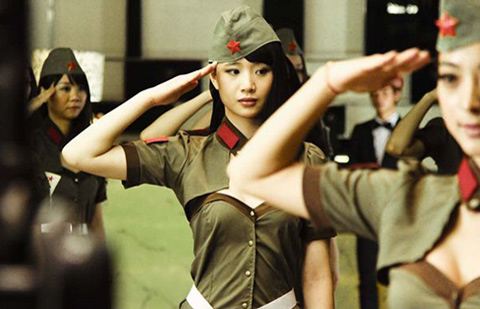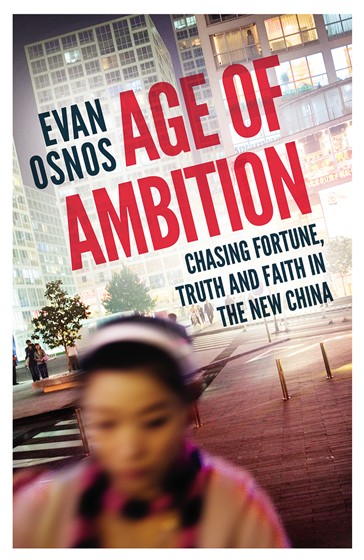
Mountains May Depart (《山河故人》 Jia Zhang-ke, 2015) depicts the breakdown of small town culture and a family unit in China, the price paid for the pursuit of the Chinese Dream and ‘going West’.
The film opens with a surreal scene of a group of people dancing to the Pet Shop Boys’ cover of ‘Go West’ by the Village People. Although this appears jarring at first glance, the symbolism of the song when sung from a Chinese perspective, ties in with the stated ambition of one of the protagonists, Zhang Jinsheng, to bring the object of his affection, Shen Tao, to the US. In the small town of Fenyang in Shanxi Zhang has a violent falling out with his friend Liangzi over the pursuit of the female lead, Shen Tao. There are then successive jumps through time, from 1996 to 2014 and finally to 2025.
We follow Zhang Jinsheng as he wins Tao’s affections (attempting to bomb Liangzi in the process), they get married and have a baby together, while the spurned Liangzi travels to another province to work in mining. As we jump again, we learn that the marriage has failed and Zhang has taken their son to live in Shanghai, while Shen Tao remains in her hometown. She has limited contact with her son, Dollar, and they have several tense and awkward exchanges when he returns from Shanghai for her father’s funeral.
With the next jump in time, Liangzi returns home after being diagnosed with lung cancer and meets again with Tao in Fenyang where she offers to pay for his treatment. An increasingly unhinged Zhang Jinsheng has taken Dollar to live in Australia, where he has all but forgotten his mother. Zhang himself hangs around with other people from his province, unable to return due to ongoing corruption purges back home and largely unable to communicate with his son, having to resort to Google Translate to hold a conversation. Dollar subsequently develops a romantic attraction to his Chinese teacher, an older woman from Hong Kong (and mother substitute), and announces that he is leaving his father. The film ends with another rendition of ‘Go West’, this time with Tao dancing alone.
As Michelle Huang’s (黃宗儀) points out in her book ‘New Feelings Between China and Hong Kong: The Politics of Emotion in Dreams of Development’ (《中港新感覺:發展夢裡的情感政治》), the culprit in the eventual misery of each of the characters in the film seems to be globalism and new iterations of the “Chinese Dream” that spur people on towards an illusory upward mobility. Contrary to popular representations of the nouveau riche in China as an aspirational identity, Huang suggests the film’s subversion of the conventional perception of the nouveau riche (「新富」) stating:
在《山河故人》中,新富人不再被單純地再現為得意洋洋的發達者或忘本者,相反地,窮人和新富都成為某種意義上的「歷史廚餘」,在社會的發展之下喪失了自身的慾望與時空感。
In Mountains May Depart, the nouveau riche aren’t purely represented as smug members of the developed world, or as those who have forgotten their roots, on the contrary, impoverished people and the nouveau riche become the ‘kitchen waste of history’, with societal development they lose their desires and sense of orientation.
Zhang JinSheng ticks all the boxes of the Chinese success story on the surface, but in reality, he is unmoored in Australia (which although in the cultural west, is ironically east of China), hanging around with a group of fellow exiles from his home province and isolated from his son. Huang talks about how Zhang Jinsheng is never really able to make the conversion from small town mindset to global or international point of view and part of this is represented linguistically. Part of this small-town mentality, is Zhang’s (rather clumsy and over the top at times) hypermasculinity, whether it is his incel-like plot to blow up his friend and rival for the affections of Shen Tao, or the collection of guns he keeps in Australia. This association of small town mindset with traditional gender roles also applies to Dollar, who Shen Tao scolds for the effeminacy she perceives as Shanghai (metropolitan/cosmopolitan) affectations, which she contrasts with the 「爽快」 (lit. frank and straightforward; read masculinity) values of small towns. She angrily removes his cravat and tells him his use of the Chinese equivalent to “Mummy” (媽米) instead of “Ma/Mum” (媽) isn’t manly enough:
「到樂,怎麼不跟媽媽說話呢?叫媽
「媽咪」
「媽咪?什麼人教你這麼叫的?」
「爽快點,叫媽」
「媽」
「不男不女的,誰給你繫的?」-Dollar, why aren’t you speaking to your mother? Call me ma!
-Mummy
-Mummy? Who taught you to say that? You should be more straightforward, and call me ma.
-Ma
-Are you a boy or a girl? Who put this thing on you?
The distance between mother and son is also emphasized through the latter’s use of Shanghainese on the phone to the woman we suppose is his step-mother and his inability to speak the local dialect. Huang states that Dollar’s ultimate unhappiness also subverts the conventional portrayals of the 「富二代」 (second-generation wealthy) in China:
全球化之下崛起的中國富二代,原本是社會轉型下最後贏家的符號,但在影片中卻被再現為一個無根者,Dollar充滿了對於空間壓縮的困感,體驗著後社會主義發展下的無奈。
Conventionally portrayed as the final victors in the social transition spurred by China’s rise and globalization, the second-generation of wealth in the film is portrayed as rootless. Dollar feels constricted and exasperated by post-socialist development.
Huang points to Tao as the embodiment of the small town culture that we see eroded throughout the course of the film, represented in the decline of Chinese New Year traditions (and Tao’s role in them at the start vs. when Liangzi returns from the other province):
在《山河故人》中,賈樟柯透過角色沈濤肉身化了鄉土情義的理念,以映照他記憶中(更準確地說是想像中)的故鄉小城。
In Mountains May Depart, Jia Zhang-ke uses the character of Shen Tao to embody nativist affection and values, to reflect the small hometown of his memory (or more accurately his imagination).
This evoked for me Shen Cong-wen’s portrayal of the border regions of China, chronicling an era on the brink of its own demise.
Some parts later in the film, particularly those parts filmed in Australia felt a little more melodramatic and corny compared to the rest of the film, but overall the film was well-paced and moving.



